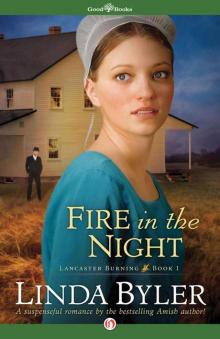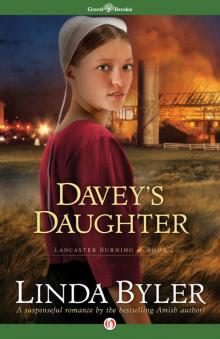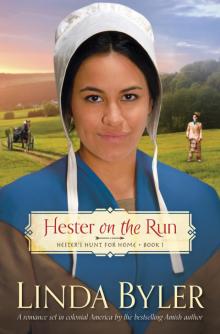- Home
- Linda Byler
A Second Chance
A Second Chance Read online
The characters and events in this book are the creation of the author, and any resemblance to actual persons or events is coincidental.
A SECOND CHANCE
Copyright © 2019 by Linda Byler
All rights reserved. No part of this book may be reproduced in any manner without the express written consent of the publisher, except in the case of brief excerpts in critical reviews or articles. All inquiries should be addressed to Good Books, 307 West 36th Street, 11th Floor, New York, NY 10018.
Good Books books may be purchased in bulk at special discounts for sales promotion, corporate gifts, fund-raising, or educational purposes. Special editions can also be created to specifications. For details, contact the Special Sales Department, Good Books, 307 West 36th Street, 11th Floor, New York, NY 10018 or [email protected].
Good Books is an imprint of Skyhorse Publishing, Inc.®,
a Delaware corporation.
Visit our website at www.goodbooks.com.
10 9 8 7 6 5 4 3 2 1
Library of Congress Cataloging-in-Publication Data is available on file.
ISBN: 978-1-68099-447-6
eBook ISBN: 978-1-68099-450-6
Cover design by Jenny Zemanek
Printed in Canada
TABLE OF CONTENTS
The Story
Glossary
Other Books by Linda Byler
About the Author
CHAPTER 1
THE INDOOR-OUTDOOR THERMOMETER ON THE HIGH SHELF IN THE kitchen registered minus four. The sun had not yet broken the frigid, creaking darkness as Edna snapped the cheap cotton sheets, threw them across the line, and tugged, arranging them hurriedly before they turned into stiff unmanageable fabric crusted with ice. As she reached into the clothespin bag tied snugly about her waist, her red, chilled fingers fumbled for one wooden clothespin out of the dozens all rolled together along the bottom. She found one and clipped it expertly to the already hardening sheet.
Icy wind was the best thing for getting rid of any germs that clung to the sheets used in childbirth. They had been washed in scalding water with a glug of Clorox, rinsed in sweet-scented Downy, and now frozen stiff in the merciless, battering wind that roared across the Indiana landscape, as level as a cookie sheet.
Jutting her chin forward, she yanked at the ends of the soft black kerchief tied around her head. Cold. It was seriously cold. Steam swirled around her as she opened the washhouse door, closing it quickly behind her, shivering slightly.
She may as well get used to it. Winter was here and laundry took up a large portion of her life, being a maud, or maid, for any young couple blessed with a squalling newborn, in need of a housekeeper, housecleaner, babysitter, cook, dishwasher, or anything that included the care of the new mother, the older children, and the husband.
Edna Miller was twenty-nine. She would turn thirty in July. All her life, from the age of fifteen, she had been hired out to any Amish family that needed her, whether at childbirth, for spring or fall housecleaning, or for keeping the home fires burning when someone went away for a vacation or to visit an ailing relative.
Short, dark-haired and dark-eyed, soft and round and capable, Edna was crackling with a zest for life. There was no job too mountainous for her. She had no husband or children, and had never had a date in her life.
She was Edna, take her or leave her.
The wringer washer chugged along with its air-powered motor undulating beneath it, the agitator jerking back and forth, creating a distinct waving motion as it scoured the whites.
She wanted a mug of steaming coffee, but knew she wouldn’t have time to drink it. Besides, she didn’t want to risk waking the sleeping, exhausted mother, or the newborn snuggled on the recliner with the grandmother who slept in her dress and black knee socks, her feet encased in men’s lined moccasins.
Poor thing. The grandmother was too old for this; covered haphazardly with an insufficient throw, her mouth hanging open as she eclipsed all the snores Edna had the misfortune to encounter.
She had a feeling this one was a bupp. The buppa were the babies whose eyebrows were raised in anxiety, who whimpered and gasped at the slightest discomfort, whose mother spent more than one long night trying to soothe them to sleep, whose father hovered with monumental attempts at fixing everything, but eventually slunk out of the house in bewildered defeat.
Edna fished a steaming towel out of the swirling, sudsy water and fed it into the wringer, then another. She hummed beneath her breath, remnants of songs heard at the New Year’s Eve hymn-singing at Atlee Rabers. Now that had been some serious party mix. She’d have to ask Atlee Katie for the recipe, perhaps make a batch. Maybe it would help to cheer up this brand-new mother, so tired and overwhelmed. Edna had been watching the rapidly receding euphoria that was the sure-fire harbinger of a grand display of baby blues, that unexplained quagmire of hormones and self-exhaustion and negative thoughts. She would do everything she could to help pull her out of it.
Leona Mast had been a beautiful highflier who had driven around with the more disobedient boys in their flashy cars or trucks and finally married her match in a wedding that had been the talk of the town. Spoiled, protected from most of life’s prickliness, this was a real waker-upper, Edna knew. Pushing any judgmental thoughts away, she resumed her humming, carried the basket of wet towels out the door, a wave of steam immediately obscuring her view.
Edna hung up the last of the towels, hurried back into the welcoming warmth of the washhouse, and decided to let the white underwear wash for fifteen or twenty minutes while she snuck around the kitchen to make a pot of coffee. Coffee was a necessary pleasure in life. Edna preferred hers with a dollop of flavored creamer, but she would settle for milk and sugar. She never drank it black.
She carried the yellow and black DeWalt battery lamp, checked to make sure it was on the lowest setting, and pushed up on the “on” button. A dim white glow bathed the kitchen in its white light and Edna began opening doors close to the gas range, fumbling to find the familiar handle of the Lifetime drip coffee maker. Ah. There it was. She drew it out slowly, careful to hold it level so it would not slide noisily, or knock the lid off. She opened the top cupboard doors, searching for the familiar blue Maxwell House container. Or the red Folgers. If she were really lucky, she’d find Starbucks or Dunkin’ Donuts. Maybe Green Mountain.
“The coffee is in the green canister with the cork lid,” came the gravelly voice from the grandmother on the recliner.
Edna jumped, thoroughly startled.
“Didn’t mean to wake you.”
“It’s alright, as long as Leona gets her rest.”
She poured the water into the top portion of the coffee maker and set it to drip, checking the time as she did so. Six-thirty. The sun would be painting white streaks on the black horizon soon. Good. Made it easier to finish hanging out the laundry. Quietly, she opened the refrigerator door, searched for the anticipated red and blue bottle of Coffeemate, discovered there was none.
From the recliner, “Leona doesn’t use creamer.”
Again, Edna jumped. Didn’t the woman miss anything? The disgruntled irk in her throat kept her from a reply.
Ah well, time to push back the irritation. She couldn’t allow it. She was here for two weeks, so Christian love was in order.
Oh God, hear my prayer. Give me a sweet, loving heart.
She went back to the washing machine, disgusted by the milk that was as bland as chalkwater, that 1% crap. Watching the figure, Leona was.
Hear my prayer, Heavenly Father.
Edna mopped the floor and rinsed the washing machine, glancing out at the clothes on the line, stiff as armor in the steady gale as winter’s icy fingers spread across the land. The wind would freeze all except a f
ew stubborn corners of the heavy towels. Socks would need to be hung from the PVC ring in a warm corner of the washhouse, but that was normal in winter.
She flung open the kitchen door, the sunrise washing the beige walls in an orange glow, the double windows above the sink on fire with the brilliance of it. Edna surveyed the perfectly crafted oak cabinets, faux ceramic tile linoleum in a blended shade of brown, the best hutch and matching table and chairs. It was every new mother’s dream kitchen. She was grateful for the toasty warmth as she set out to prepare breakfast. New mothers needed fiber, so she began preparing a dish of baked rolled oats with apples and raisins, making only a minimum of noise.
She heard the recliner’s soft release, turned to see the grandmother sitting upright, holding the swaddled newborn.
“Can you hold her a while, till I go to the bathroom?” she asked, her voice thick with fatigue. Edna knew she had barely slept for the second night in a row and felt a dash of sympathy.
“Just lay her down, she’ll be fine,” Edna replied with all the confidence acquired from years of working with mothers and babies.
“She’ll wake up, I’m afraid. Come take her.”
So Edna went, lifted the baby carefully, and lay the sleeping baby on its side, drawing the blankets up to cover her ears.
This one was a cutie, with all that dark hair and round face. Of course, both parents were nothing to sneeze at, so you could expect a cute one from this couple.
But all babies were cute, every one. Innocent little gifts of God, for sure.
Edna loved the babies, loved to bathe and cuddle and swaddle them. It was a joy to hand them, clean and fresh, to the appreciative mothers, the benevolent fathers.
Most of the time.
As with many other jobs, this one had its downsides, which she figured was completely normal, so her ambition never wavered. Her enthusiasm to meet another family, another newborn, another washing machine, was what kept life interesting.
Edna was the youngest of six children. Her three brothers and two sisters were all married and lived in Indiana, in various homes with various children in various stages of finances and acquisitions. Edna had worked as maud for all of them at various times. The sisters-in-law were good friends, all of them amiable, easy to accommodate, and her nieces and nephews were like bright flowers dotting her existence. There were seventeen of them—eight girls and nine boys.
Her aging parents were a growing cause for concern. They were in their seventies, with health problems cropping up like unwanted dandelions in an otherwise well-kept garden.
But there was no time to think of all that now. The toast was done, eggs scrambled, juice poured. The table was set with yellow Fiestaware, like individual spots of sunshine on the snowy tablecloth, the orange juice in the glasses reflecting more of the golden glow. She placed the steaming casserole of baked oatmeal on a cast-iron trivet near the butter dish and a tiny pot of strawberry jam.
Edna stood back, pleased.
“Breakfast!” she sang out, the old elation rolling over her as she waited to see the happy faces, the appreciative words. It was what she loved to do.
The grandmother scuttled into view, a forefinger to her thick, chapped lips, her eyes bright with warning.
“Shh. Don’t wake Leona.”
“I thought she was awake.”
“She was. But the baby is sleeping so I told her to get her rest. She’s not going to sit up at the table yet. She’ll need a tray.”
She lifted her chin to peer through her bifocals at the baked oatmeal.
“Do I see raisins?” she asked in a churlish tone.
“You do. You do see raisins,” Edna replied, a stiff smile drawing her lips away from her teeth.
“Leona won’t eat raisins. You’ll have to eat it yourself.”
“Oh. Well, I can. What about you? Will you join me?”
“I don’t eat raisins.”
“Oh. Will you eat the toast and scrambled eggs with me?”
“White or wheat?”
Edna thought she was trying to be funny, making up a bird tune, “whit a wheet, whit a wheet.” She laughed, her faced wreathed in happiness, so glad to find a rare spot of humor in this serious, careful house.
She finished laughing, said “Uh, Huh! Yeah,” and was pinned to the wall with angry darts from the grandmother’s eyes.
“I fail to see what’s so funny. I asked if the toast was made with white bread or whole wheat. I don’t eat whole wheat.”
“I see. Actually, it’s white.”
“Then I’ll eat.”
“Good.”
They slid into chairs simultaneously, bowed their heads with unspoken agreement born of years of tradition, and prayed in silence to thank God for the food. Edna added a plea of deliverance from judgmental thoughts.
Being the soft, round little person she was, Edna needed sustenance after hanging all those wet clothes out in the arctic chill, so she heaped a sizable portion of fluffy scrambled eggs onto her smooth yellow plate. She reached for a slice of toast and proceeded to spread it thickly with butter, while the grandmother picked at the crust on her toast, then lifted a cup of black coffee to her lips with one pinkie held at a fashionable angle.
“I don’t care much for scrambled eggs. I eat mine poached.”
“Is that right?”
“You don’t need to use sarcasm.”
“Oh, of course not. Didn’t mean to sound sarcastic at all. I have never heard of anyone who doesn’t eat scrambled eggs.”
She held up a finger. “Leona?”
There was a weak wail from the bedroom, and the grandmother knocked over her chair to get to her long-suffering daughter quickly. Edna glanced at the sleeping baby as the grandmother sailed past on small, tapping feet.
She shrugged, figured this was a good time to dispatch of the scrambled eggs, which were absolutely wonderful with a glug of homemade ketchup and a slice of buttered and jellied toast. She paid no heed to the low murmurings from the bedroom. She reveled in every bite, washing it all down with copious amounts of orange juice.
“Edna!” came the grandmother’s panicked voice from down the hall.
“Yes?”
“We need your help.”
“Coming.”
Two pale faces greeted her entrance, one with fatigue, the other with anxiety.
“She needs help. There. Lift her from the other side. Careful now, she has a sore shoulder. Ready, Leona?”
A weak gasp escaped Leona’s lips before she sagged back on the bed.
“It’s alright, Leona. Take your time.”
To Edna, “She’s been through so much.”
Edna tried to stop the thoughts, but they barged right through and made themselves known.
Oh for crying out loud. Did she now? No worse than thousands of other women before her and no doubt thousands after.
The baby grunted and began a high-pitched yowl of hunger, sending Leona back against the pillows with a shuddering sigh. Fat, glistening tears of hopelessness slid down her porcelain cheeks, sending the grandmother shuffling off to the recliner, shaking her hands as if ridding herself of an ant invasion.
Disaster Alert. All units deployed. Edna hid a maniacal grin and went to relieve the grandmother of the howling infant, sending her hurrying back to her despondent daughter. She took the baby to the adjacent nursery, decorated in beige and turquoise.
She unwrapped the little girl and changed the tiny Pamper, a chore she never tired of. The tiny, delicate, perfectly formed limbs, the rounded velvety stomach, the ten fingers and ten toes. Miraculous. Truly angelic.
With sure fingers, she zipped up the warm sleeper with the purple giraffes all over it, tucked her back in the soft blanket, and carried her to Leona.
“Time to eat, Mama!” she trilled brightly, her intention of lifting some spirits falling flat as Leona glared and the grandmother scowled.
“I can’t nurse her now. I need to eat first.”
Unbelievable.
> A hot thrust of outrage thrust through Edna. Never one to mince her words for the sake of others, she could not help herself, opening her mouth to deliver a firm, well-meaning lecture that folded itself like plastic wrap around mother and daughter.
“You can and you will, Leona. You have just brought this innocent angel into the world, and now it is your duty to provide for her to the best of your ability. Your life is no longer your own. You will make sacrifices for this child, and you may as well start now.”
They both looked as if they might suffocate, but Leona dried her tears and sat up while Edna arranged pillows behind her back, brought a snowy white burp cloth, and helped her get the baby situated and latched on.
“Now sit back, try to relax.”
Turning to the weary, harried grandmother, Edna said she was going to make arrangements for her departure, hushing Leona’s protests.
“No. Nope. Time Momma leaves now. After three days visitors stink like fish.”
The grandmother’s mouth opened and closed like a fish, but no words came forth.
After the baby was settled, Edna made a perfect cup of poached eggs for Leona. She delivered them with freshly buttered toast and sat watching with pity as Leona suppressed her ravenous appetite by taking small, careful mouthfuls under the watchful eye of her mother. Edna dug into the baked oatmeal, heaping a cereal bowl with it. She washed it down with a cup of coffee laced with sugar and more of the thin, chalky milk.
“I hurt,” Leona moaned.
“Normal thing to do. I’ll put a clean sheet on the recliner and you can rest. Time you got out of that bedroom, O.K.?”
Her mother opened her mouth to protest, but Edna waved her away.
“Call a driver. Time for you to go.”
Edna could tell there was no love wasted between them, but that was alright. She’d seen it too many times. Overprotective mothers only enhanced the daughter’s symptoms, besides robbing them of the ability to draw on their own reserves of confidence.
Time to go, Momma Bear, she thought.
The pretty house was bright with winter sunshine. The wind hummed around the eaves, sending snow spray cascading down from the spouting, whirling it away in a diaphanous curtain across the front lawn.

 A Second Chance
A Second Chance Lizzie's Carefree Years
Lizzie's Carefree Years The More the Merrier
The More the Merrier Love in Unlikely Places
Love in Unlikely Places Running Around (and Such)
Running Around (and Such) Wild Horses
Wild Horses Lizzie Searches for Love Trilogy
Lizzie Searches for Love Trilogy Lizzie and Emma
Lizzie and Emma Little Amish Matchmaker
Little Amish Matchmaker The Witnesses
The Witnesses The Healing
The Healing Home Is Where the Heart Is
Home Is Where the Heart Is Fire in the Night
Fire in the Night When Strawberries Bloom
When Strawberries Bloom Little Amish Lizzie
Little Amish Lizzie Which Way Home?
Which Way Home? The Homestead
The Homestead Sadie’s Montana Trilogy
Sadie’s Montana Trilogy Davey's Daughter
Davey's Daughter Hester on the Run
Hester on the Run Disappearances
Disappearances Big Decisions
Big Decisions Becky Meets Her Match
Becky Meets Her Match Hope on the Plains
Hope on the Plains Christmas Visitor
Christmas Visitor